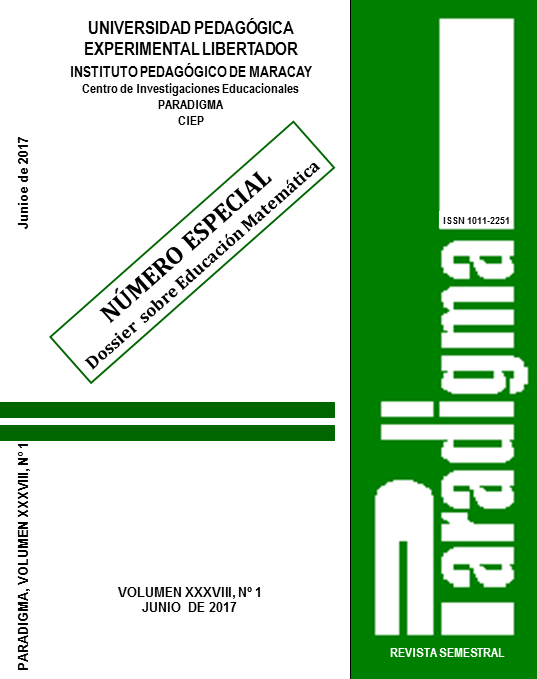LAS FINALIDADES DE LA PLANEACIÓN DIDÁCTICA POR DOCENTES EXPERIMENTADOS Y NO TAN EXPERIMENTADOS
DOI:
10.37618/PARADIGMA.1011-2251.2017.p104-122.id603Resumo
Se presentan resultados de un estudio cuantitativo cuya hipótesis es que los docentes, según su antigüedad en el servicio, tienen diferenciadas concepciones en cuanto a finalidades para elaborar sus planeaciones didácticas; en correspondencia con estudios en que se ha identificado que las planeaciones varían si se trata de profesores principiantes o experimentados (Arends, 2007; Rueda, 2011). Se tomaron tres grupos de maestros de secundaria cuya antigüedad laboral corresponde con los cambios más notables en las reformas educativas en México en los últimos 30 años. Los resultados muestran que en lo general no se tienen diferencias significativas; no obstante, se identificó que planear para cumplir el requisito demandado por la autoridad educativa es estadísticamente diferente entre profesores nóveles, de mediana antigüedad y experimentados, siendo estos últimos quienes lo hacen más para tal fin y en última instancia los segundos. Planear para la evaluación del desempeño y para desarrollar competencias en los alumnos no presentan diferencias significativas en los tres grupos de docentes. Por último, planear para que los alumnos aprendan contenidos es una finalidad didáctica (enfoque tradicional) mayormente presenten en los maestros nóveles, seguidos de los de mediana antigüedad; difiriendo significativamente con los más experimentados, quienes lo hacen en menor medida.Palabras clave: Planeación didáctica, modelos educativos, finalidades de la planeación didáctica.AbstractIt is presented the results of a quantitave study which its hypothesis is that teachers; according to their seniority in service, have differentiated conceptions regarding the finalities for elaborating their didactic planning in correspondence to studies in which it has been identified that such plannings vary if they correspond to novice or experienced teachers (Arends, 2007;Rueda, 2011). They were taken into consideration three groups of secondary school teachers which seniority corresponds with the most noticeable changes in the educational reforms in Mexico in the latest 30 years. The results show that in general there are not meaningful differences. However, it was identified that planning in order to fulfill with the demanded requirement by the educative authority, is statistically different among novice teachers of medium seniority and experienced teachers, being the latest ones who do planning beyond such finality and at the last instance the second ones. Planning for evaluation of the job performance and to develop competencies in the students, does not present meaningful differences in the three groups of teachers. Finally, planning for the students to learn the content, is one didactic finality (traditional approach), mostly presented in novice teachers, followed by the medium seniority; differing materially from the most experienced teachers, who did it in small extent.Keywords: Educational planning, educational models, educational planning finalities.Downloads
Não há dados estatísticos.
Downloads
Publicado
2017-06-26
Métricas
Visualizações do artigo: 598 PDF (Español (España)) downloads: 1429
Como Citar
López-Loya (CIFE-México), J., Brito Lara (ENSOG-México), M., & Parra Acosta (UACH-México), H. (2017). LAS FINALIDADES DE LA PLANEACIÓN DIDÁCTICA POR DOCENTES EXPERIMENTADOS Y NO TAN EXPERIMENTADOS. PARADIGMA, 38(1), 104–122. https://doi.org/10.37618/PARADIGMA.1011-2251.2017.p104-122.id603
Edição
Seção
Artículos


 English
English
 Español (España)
Español (España)
 Français (France)
Français (France)
 Português (Brasil)
Português (Brasil)




















































